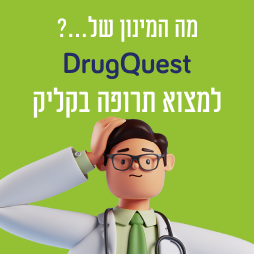Quest for the right Drug
אופטלגין טבע OPTALGIN TEVA (DIPYRONE)
תרופה במרשם
תרופה בסל
נרקוטיקה
ציטוטוקסיקה
צורת מתן:
תוך-ורידי, תוך-שרירי : I.V, I.M
צורת מינון:
תמיסה להזרקה : SOLUTION FOR INJECTION
עלון לרופא
מינוניםPosology התוויות
Indications תופעות לוואי
Adverse reactions התוויות נגד
Contraindications אינטראקציות
Interactions מינון יתר
Overdose הריון/הנקה
Pregnancy & Lactation אוכלוסיות מיוחדות
Special populations תכונות פרמקולוגיות
Pharmacological properties מידע רוקחי
Pharmaceutical particulars אזהרת שימוש
Special Warning עלון לרופא
Physicians Leaflet
Pharmacological properties : תכונות פרמקולוגיות
Pharmacodynamic Properties
5.1 Pharmacodynamic properties Pharmacotherapeutic group: analgesics; other analgesics and antipyretics; pyrazolones ATC code: N02BB02 Dipyrone is a pyrazolone derivative and has analgesic, antipyretic and spasmolytic properties. The mechanism of action has not been fully explained. Some study results show that dipyrone and its main metabolite (4-N-methylaminoantipyrine) probably have a central as well as a peripheral mechanism of action.
Pharmacokinetic Properties
5.2 Pharmacokinetic properties After oral administration, dipyrone is completely hydrolysed to the pharmacologically active 4-N-methylaminoantipyrine (MAA). The bioavailability of MAA is approximately 90% and is somewhat higher after oral administration than after parenteral administration. Taking the product with meals has no relevant influence on the kinetics of dipyrone. The main metabolite of metamizole, MAA, is further metabolised in the liver through oxidation and demethylation, followed by acetylation. Its clinical efficacy is based mainly on MAA, and to a certain extent also on the metabolite 4-aminoantipyrine (AA). The AUC values for AA are approximately 25% of the AUC values for MAA. The metabolites 4-N-acetylaminoantipyrine (AAA) and 4-N-formylaminoantipyrine (FAA) appear to be pharmacologically inactive. It must be noted that all metabolites have non-linear pharmacokinetics. It is not known whether this phenomenon has any clinical significance. The accumulation of metabolites is of little importance in short-term treatment. Dipyrone crosses the placenta. Dipyrone metabolites are excreted in breast milk. Plasma protein binding for MAA is 58%, for AA 48%, for FAA 18%, and for AAA 14%. The plasma half-life of dipyrone after intravenous administration is about 14 minutes. About 96% of a radiolabelled dose is recovered in the urine after intravenous administration, and about 6% in the faeces. After a single oral dose, 85% of the metabolites excreted in the urine could be identified. Of these, 3±1 % were MAA, 6±3 % AA, 26±8 % AAA and 23±4 % FAA. Renal clearance in ml/min after a single oral dose of 1g dipyrone was 5±2 % for MAA, 38±13 % for AA, 61±8 % for AAA and 49±5 % for FAA. The respective plasma half-lives in hours were 2.7±0.5 % for MAA, 3.7±1.3 % for AA, 9.5±1.5 % for AAA and 11.2±1.5 % for FAA. Elderly patients and patients with hepatic dysfunction The AUC increases 2- to 3-fold, in the treatment of elderly patients. After a single oral dose, the half- life of MAA and FAA increased approximately threefold in patients with cirrhosis of the liver, whereas the half-life of AA and AAA did not increase to the same extent. High doses should be avoided in these patients. Children and adolescents Children display more rapid elimination of the metabolites than adults. Renal impairment The data available from patients with impaired renal function show a reduced elimination rate for some metabolites (AAA and FAA). High doses should therefore be avoided in these patients.

שימוש לפי פנקס קופ''ח כללית 1994
לא צוין
תאריך הכללה מקורי בסל
לא צוין
הגבלות
לא צוין
מידע נוסף
